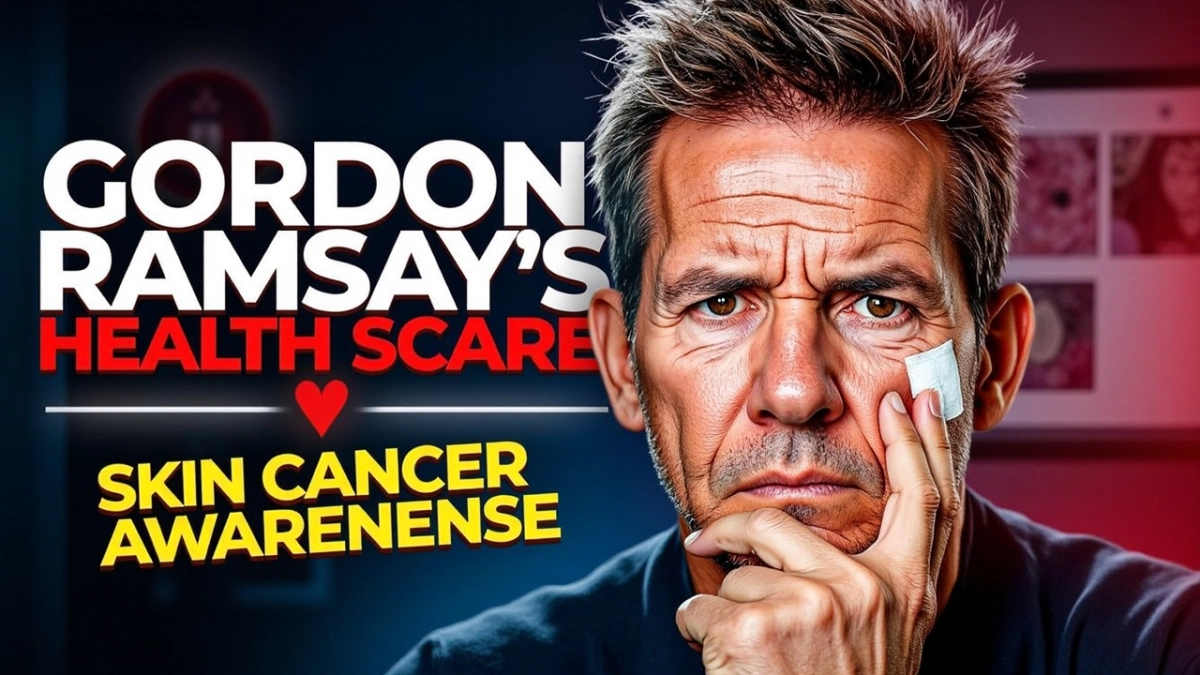Celebrity news is usually about scandals, restaurants, or TV drama. But when the story is about skin cancer and Gordon Ramsay, it lands differently. This isn’t just gossip—it’s a real health wake-up call.
Ramsay, known for his sharp tongue and Michelin stars, revealed in 2017 that doctors had flagged suspicious spots on his face during a routine check in Los Angeles. The advice? Immediate removal, because the markings suggested the early stages of skin cancer. He underwent treatment and later shared the experience, warning others not to ignore sun safety.
That’s the headline. But here’s the real value: Ramsay’s case isn’t just about one celebrity. It shines a light on the broader risks of melanoma and non-melanoma skin cancers, prevention strategies, and why regular check-ups matter—especially for people who spend a lot of time outdoors.
This article breaks it all down: the medical side, the personal angle, the prevention playbook, and what you can learn to protect yourself.
Why Gordon Ramsay’s Case Resonates
Plenty of celebrities have had cancer scares. But Ramsay’s story stands out for a few reasons:
- High visibility: Millions of people watch him on TV, so when he talks about health, it spreads.
- Relatable cause: Skin cancer is not rare—it’s the most common form of cancer in the U.S. and U.K.
- The surprise factor: Ramsay is fit, active, and wealthy. If it can hit him, it can hit anyone.
What Exactly Happened to Ramsay?
The exact diagnosis wasn’t disclosed—he kept it private—but reports suggest it was a precancerous lesion or early non-melanoma skin cancer. Doctors spotted sun damage and advised removal.
Ramsay later posted a photo with a bandage on his face, thanking doctors and reminding fans to use sunscreen.
That’s significant: he didn’t wait. He didn’t brush it off as “just a mole.” Early intervention probably saved him from something far worse.
Skin Cancer Basics You Need to Know
Skin cancer isn’t one disease—it’s an umbrella term. Here’s the quick breakdown:
Types of Skin Cancer
- Basal Cell Carcinoma (BCC): The most common, slow-growing, rarely spreads but can damage skin tissue.
- Squamous Cell Carcinoma (SCC): Slightly more aggressive, can spread if untreated.
- Melanoma: Less common but deadly; responsible for the majority of skin cancer deaths.
Risk Factors
- Excessive UV exposure (sun or tanning beds).
- Fair skin, light hair, or blue/green eyes.
- Family history of skin cancer.
- Weak immune system.
- Outdoor lifestyle (chefs in hot kitchens + sports, like Ramsay, increase cumulative exposure).
Why Early Detection Matters
Skin cancer caught early is almost always treatable. Wait too long, and outcomes get much worse.
According to the American Cancer Society:
- 5-year survival rate for localized melanoma: ~99%.
- For distant-stage melanoma (spread to organs): drops to ~32%.
This is why Ramsay’s check-up wasn’t just lucky—it was lifesaving.
Practical Takeaways From Ramsay’s Story
1. Don’t Skip Dermatology Checks
An annual skin check is quick, painless, and can detect trouble early.
2. Watch Your Own Skin
Look for the ABCDE rule of melanoma:
- Asymmetry: one half doesn’t match the other.
- Border: irregular, jagged, or blurred.
- Color: uneven shades (brown, black, red, white, or blue).
- Diameter: larger than 6mm (pencil eraser).
- Evolving: changing shape, size, or color.
3. Respect the Sun
Ramsay spent years under bright kitchen lights and on outdoor sets. Sunscreen and hats aren’t optional—they’re essentials.
Ramsay’s Advocacy: Why Celebrities Matter in Health
When someone like Ramsay talks about skin cancer, awareness skyrockets. Celebrities bridge the gap between medical advice and public action.
We’ve seen this before:
- Angelina Jolie and her preventive mastectomy raised awareness of BRCA genes.
- Michael J. Fox became a voice for Parkinson’s disease.
Ramsay—loud, brash, and unfiltered—is an unlikely skin cancer advocate. But maybe that’s why it works. He tells people bluntly: don’t ignore your skin.
Lifestyle Links: Diet, Stress, and Healing
Here’s an under-discussed angle: Ramsay isn’t just a TV personality—he’s a chef. And diet ties directly into both cancer risk and recovery.
- Antioxidant-rich foods (berries, leafy greens, nuts) may help reduce oxidative stress.
- Vitamin D balance matters: too much sun raises cancer risk, but too little weakens bones and immunity.
- Alcohol intake (common in hospitality culture) is a known cancer risk factor.
What People Search For (Hidden Queries Answered)
Based on user intent, here are the silent questions Ramsay’s story triggers—and the answers:
Did Gordon Ramsay have melanoma?
No official confirmation. Most sources say it was an early non-melanoma lesion.
Can chefs be at higher risk?
Yes. Heat exposure, UV from outdoor filming, and irregular schedules (weaker immunity) may contribute.
Did he have surgery?
He underwent removal of suspicious spots. Minor surgery is common for early detection.
Is skin cancer hereditary?
It can be. Family history raises risk, but lifestyle factors matter more.
How do I know if I should see a doctor?
If you notice new or changing moles, unusual skin patches, or sores that don’t heal, book a dermatologist.
Action Plan: Protecting Yourself Today
- Use Sunscreen Daily
SPF 30+ broad-spectrum, even in winter. - Wear Protective Clothing
Hats, long sleeves, UV-blocking sunglasses. - Avoid Peak Sun Hours
10 a.m. – 4 p.m. is the danger zone. - Skip Tanning Beds
Artificial UV is just as harmful. - Check Your Skin Monthly
Use mirrors or ask a partner. - Book Annual Exams
Make it as routine as dental cleanings.
Closing Thoughts
Gordon Ramsay’s brush with skin cancer isn’t just a headline—it’s a mirror. It reminds us that health doesn’t care how rich, busy, or successful you are. If you ignore warning signs, cancer doesn’t wait.
The good news: most skin cancers are preventable with awareness and simple protective steps. Ramsay’s experience proves the point—catch it early, act fast, and live on.
So next time you head out without sunscreen, ask yourself: would you ignore the advice if your doctor told you what Ramsay’s doctor told him? Probably not. Neither should you.

